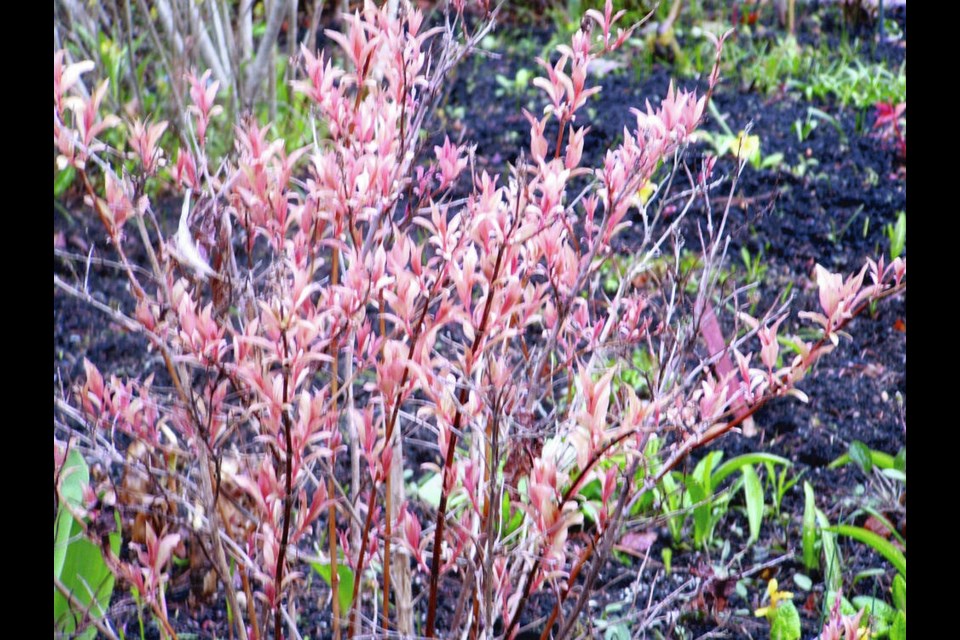As days rapidly lengthen and light levels (on some days) elevate, I find myself looking forward to one of the sure and spirit-lifting signs of spring in the garden — the gorgeous coral-red buds swelling on the red huckleberry (Vaccinium parvifolium) bushes that grow in several areas of the back garden.
The plants were here when I arrived, just one of the many kinds of native species that were part of the property’s woodland. I treasure them all: the vase-shaped red huckleberry shrubs, the holly-like, low-growing Oregon grape and the salal with their bright yellow flower clusters and dusty-dark berries, the imposing sword ferns and soft carpets of vanilla leaf.
It is usually some time in March when I begin to notice budswell on the red huckleberry bushes, as the stems become dotted with dark coral growth buds that take on that lovely colouring as they begin expanding.
The buds unfurl to create a second act of their seasonal show — a mass of new leaves in coral pink. Then, late in the summer, comes Act 3 featuring small, round, bright coral berries that are wonderful snacks, rich in vitamin C. The berries offer a feast also for birds.
Winter whirring. Speaking of birds, a few days before Christmas, as I was talking with my son on the phone, I walked to the living room window at the front of the house and noticed a hummingbird darting from place to place below tufts of snow on a spreading strawberry tree (Arbutus unedo) nearby.
The tiny bird was seeking out vestiges of the small, drooping, tubular flowers that adorn the tree from mid-autumn to early winter.
Later on that same day, a young friend and garden helper visited with a Christmas card and news of her engagement. As I greeted her at the top of the driveway, beside the strawberry tree, there was the hummingbird, still darting on whirring wings through the tree.
A month later, I ventured into the back garden to check out the climbing roses and kiwi vines that would need pruning soon. Again, there was the familiar whirring of a hummingbird flying from a woodland clearing behind the garden shed into a kiwi vine.
These tiny creatures are a marvel of survival. To see and hear them, especially in the winter garden, is an uplifting treat.
Requiem for a tree. I’ve never had a tree die on me before, but it looks as though my cherished prune plum tree is on its slow way out. Several main limbs, clearly dead, have been removed.
It happens. The tree is over four decades old. It has served me wonderfully well. Friends and neighbours too have shared in the delights of the sweet, juicy plums over the years.
Before long, I’ll know whether the remainder of the tree will manage to leaf out and bloom. Meanwhile, a replacement tree is ordered for picking up and planting next month, in a sunny corner of the food garden where raspberries, strawberries, and a fig tree thrive.
GARDEN EVENTS
VHS meeting. The Victoria Horticultural Society is hosting a Zoom meeting on Tuesday from 7 to 8:30 p.m. Nancy Turner, an ethnobotanist who has worked with Indigenous elders and cultural specialists for over 50 years, will speak about Wild Cultivation: Traditional Plant Management Systems of Northwestern North America. Cost to non-members $5. To register, visit .
Nanaimo meeting. The Nanaimo Horticultural Society will meet on Wednesday at 7 p.m. in First Unitarian Fellowship Hall, 595 Townsite Rd. More information at [email protected].
Floral art. The Mid Island Floral Art Club will meet on Thursday at 2 p.m. in St. Stephens Church Hall, 150 Village Way in Qualicum Beach. The topic for the afternoon is “Learning Floral Structures.” Guests are welcome. Information at [email protected].
Creating a meadow. The Compost Education Centre, 1216 North Park St. in Victoria, is offering a workshop on Converting a Lawn to a Native Plant Meadow on Saturday, Feb. 11, 1 to 3 p.m. The workshop will describe ways in which individuals can convert under-utilized lawn space into pollinator-friendly landscapes using native plants to help restore biodiversity. The workshop will close with a visit to the centre’s demonstration garden to view the plants discussed. For more information and registration, call 250-386-9676, email [email protected], or go online at



